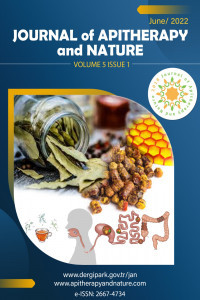Some Apitherapeutic Properties of Chestnut Propolis
Some Apitherapeutic Properties of Chestnut Propolis
___
- .
- Yayın Aralığı: Yılda 2 Sayı
- Başlangıç: 2018
- Yayıncı: Oktay YILDIZ
Propolis: Pharmacological Properties and Medical Applications of Propolis in Modern Medicine
Chemical Profiling of Tropical Propolis: Challenges and New Data
Milana POPOVA, Boryana TRUSHEVA, Kristina GEORGIEVA, Vassya BANKOVA
GC-MS and UPLCA-PDA-TOF Profile of Polish and Eurasian Propolis
Jarosław WIDELSKI, Piotr OKIŃCZYC, Antoni SZUMNY, Jakub SZPERLIK, Anna KULMA, Zbigniew SROKA, Krystyna SKALICKA-WOŹNIAK, Tomasz MROCZEK
Muhammad IQBAL, Tai-ping FAN, David WATSON, Sameah ALENEZI, Muhamad SAHLAN
Toothpaste with Propolis “Apident” Shows Antimicrobial Activity in vitro
Klemen RIHAR, Dunja Gregorič EXEL, Adriana PEREYRA, Rok KOPINČ, Bratko FILIPIČ
Zaccaria VINCENZO, Galeotti FABIO, Fachini ALFREDO, Passarella PAOLO, Daglia MARIA, Volpi NICOLA
Effect of Brazilian Propolis-containing Ointment on Genital Itching in Menopausal Women
Hiroshi MIURA, Yasuko MIURA, Yuki SHIMODA, Satoko KAGABU, Hiromitsu TSUBAKI, Yukihiro TERADA
Insights and Pitfalls in Propolis Research
Vassya BANKOVA, Milena POPOVA, Boryana TRUSHEVA
Fatty Acid Analysis and Biological Activity of Jordanian Propolis
Ashok K. SHAKYA, Shankar KATEKHAYE, Ghaleb A. ORIQUAT, Rajashri R. NAIK, Rajashri R. NAIK, Anant PARADKAR, Hugo FEARNLEY, James FEARNLEY
María İnmaculada GONZÁLEZ-MARTÍN, Eddy Valentín BETANCES-SALCEDO, İsabel REVILLA, Ana María VIVAR-QUINTANA
